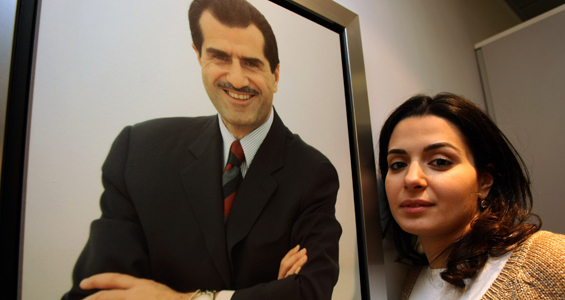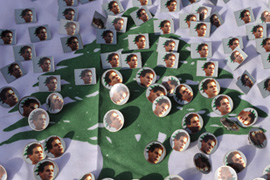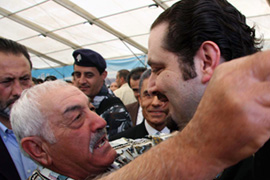Lebanese politics: Family affair
Democratic elections but feudal fiefdoms continue to thrive in modern-day Lebanon.

 |
| Nayla Tueni is standing for election after her father Gebran [pictured] was killed in 2005 [AFP] |
The upcoming Lebanese general election offers an opportunity to observe a monarchical democracy in action as sons and daughter of slain leaders compete in June’s election in unprecedented number.
Nayla Tueni, 26 – the daughter of assassinated journalist and MP Gebran Tueni and granddaughter of current MP Ghassan Tueni – is standing in Achrafiyeh, also known as Beirut District One.
| In depth | ||
IN VIDEO INTERACT |
Her maternal grandfather is former minster Michel Murr, whose own son Elias is now Lebanon’s defence minster.
Nadim Gemayel, 27, is also running for election in Achrafiyeh. Like Tueni, politics definitely runs in his family.
Gemayel is the son of Bashir Gemayel, a former president-elect assassinated days before his swearing-in ceremony in September 1982.
Meanwhile the younger Gemayel’s cousin, 29-year-old Sami who is also the son of another former president, is standing for election in the Matn district of Mount Lebanon.
All of the Gemayels belong to the Phalange Party.
And voters, of their own free will, are rushing to usher in their parliamentary representatives on the basis of surname and, effectively, right of succession.
So entrenched is this practice that it transcends regions, but it is especially predominent among Christians. Why?
Lebanese democracy is one of the biggest myths in the modern Middle East.
Since independence in 1943, there have been parties, elections and a parliament but another reality lies behind this apparent democracy.
Dynastic tendency
Political power, either within parties or as independent politicians, is largely transferred along hereditary lines. Political careers are passed on from father to son, husband to wife and brother to brother.
This dynastic tendency in Lebanese politics is present in nearly every party to the point where it is virtually impossible to distinguish between loyalty to the party and loyalty to the family.
Myths seem to be an indispensible part of the creation of the modern state. In the Middle East, most of the countries were created either by the forceful inclusion of small entities and principalities, or as the result of the disintegration of multi-national, multi-religious empires.
And Lebanon was no exception.
|
“There was no entity called Lebanon before the French set foot in the region in 1920” |
As a result of the collapse of the Ottoman Empire and the subsequent scramble by the victors of World War One to divide up the territories between themselves, Syria and Lebanon were placed under French control.
Except there was no entity called Lebanon before the French set foot in the region in 1920.
There was a Mount Lebanon and the majority of its inhabitants were Maronite Christians – an eastern Catholic denomination. So a viable state had to be built around, and for the benefit of, those inhabitants.
The fact that they were allies and co-religionists of France helped their cause.
But a myth had to be created all the same, as the new country of Lebanon was both the result of the disintegration of an empire and the forceful inclusion of at least three small regions into a centralised state.
Maronite influence
The myth, of course, was the distinctiveness, uniqueness and superiority of the Maronite sect, its mythical past in Mount Lebanon and even its different ancestry to its neighbours.
Maronites were Christians, Phoenicians, Mediterranean and liberal. Their neighbours were Muslim, Arab, Middle Eastern and illiberal.
And from these ideas the Phalange party was formed. The Phalangists started out as a paramilitary youth organisation modelled along 1930s German National Socialist lines, as observed by the party’s founder Pierre Gemayel.
Studying this party is studying the history of Lebanon: it is the oldest of the Christian parties, and it has produced Lebanon’s best-known dynasty.
 |
| Badges of assasssinated former minister Pierre Gemayel were on sale in Beirut [EPA] |
At 83, Joseph Abu Khalil, is one of the oldest members of the current Phalange party, having joined it at the age of 16.
“Lebanon was established in 1920 as a Christian project, stemming from a Christian political ideology. The Phalange party is based on that, and is a defending force for it,” he says.
Karim Paqradouni, a former leader of the party and its past ideologue, echoes this sentiment: “The Maronites regard themselves as the founders of Lebanon, it was established by them, and for them. They can only see Lebanon through their religious sect.”
But Lebanon’s other sects outnumber Maronites by about two to one. Therefore, the ‘founders of Lebanon’ have to struggle hard to maintain what many regard as their superior position as given to them by the French, their former colonisers.
The Christian parties, and the Phalangists in particular, have taken it upon themselves to do just that. And so the political party became the representative of the religious sect. In turn, as the family is at the centre of every party, surnames came to represent each sect.
It is a position that attracted the devotion of sect members and was cultivated by each of the political families.
There are other factors behind Lebanon’s reliance on what could be described as a modern-day feudal political system.
Protecting traditions
Sociologically, most communities living in multi-ethnic entities and with no experience of representative democracy there is a security dilemma.
Fear that their particular traditions and culture will be overwhelmed and disappear altogether has allowed politicians to overplay the need for voters to back and enforce their particular sect’s party – so ensuring their own survival.
Historically, the centrality of the family is easily traced to feudal times when the overlord allowed peasants and their families the use of land in exchange for unquestioned loyalty.
 |
| Saad Hariri, right, is standing for re-election after his father, Rafiq, was killed in 2005 [EPA] |
In more recent times, this social system has been translated into the current political set-up; the overlord has become a political leader, the peasants have become his constituents, and, instead of land, favours are exchanged for electoral loyalty.
It follows, of course, that political candidates need to demonstrate they fulfil the requirements set down by this Lebanon legend by tracing their own ancestry.
Suleiman Franjieh, a former president who hails from the northern Lebanese town of Zghorta, is an example of this phenomenon.
He has claimed to be a direct descendent of a crusader – his name translates as Frankish, the term used by Arabs to describe the Crusaders. Interestingly, his grandson, also named Suleiman, is contesting the coming elections in the same town.
Moreover, the first community to have a long established ruling family were the former lords of Mount Lebanon: the Druze, whose religion is an offshoot of Islam.
Their former peasants, the Maronite Christians, assumed this feudal tradition when they eventually outnumbered and overwhelmed their former overlords. Having such families denotes respectability and traceable tradition.
So, when the election score sheets are counted at midnight on June 7, one obvious winner will be the decades-old fusing of politics, history, region and religion.
It is unlikely this vote will unsettle the elected dynasties that continue to dominate Lebanon’s monarchical democracy.

 The battle for votes
The battle for votes